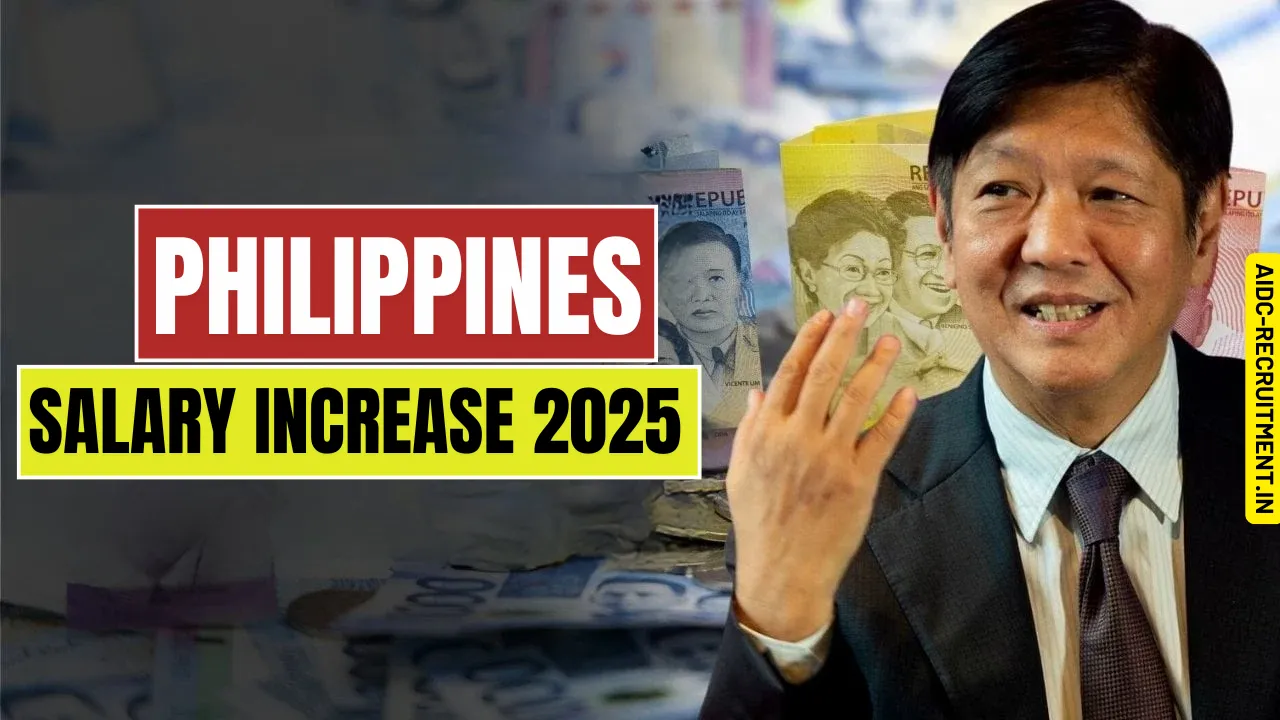Philippines Salary Increase 2025: The Philippines Salary Increase 2025 is poised to bring significant changes to the lives of Filipino workers. As living costs continue to rise and economic conditions evolve, the Department of Labor and Employment (DOLE) has announced measures to ensure fair compensation across industries. This development is a response to growing calls for equitable wages and aligns with government initiatives to enhance the standard of living for millions of Filipinos.
In this article, we’ll dive deep into when the salary increases will take effect, who stands to benefit, and why these changes are critical. From public sector adjustments to private industry trends, here’s everything you need to know about this important update.
Key Details About the Philippines Salary Increase 2025
| Aspect | Details |
| Announcement Date | February 2025 |
| Effective Date | To be announced |
| Current Minimum Wage | 610 PHP per day |
| Projected Median Growth | 6.2% by 2025 |
| Impacted Sectors | Retail, IT, Outsourcing, Services |
When Is the Salary Increase Happening?
The salary increase, while much anticipated, has yet to see a specific implementation date. The current minimum wage of 610 PHP per day, last adjusted in 2023, is expected to remain in place until updates are formalized later in 2025. However, businesses are preparing for a 5.7% increase in median salaries, signaling economic shifts across industries.
The expected median salary growth of 6.2% by 2025 reflects the country’s ongoing economic expansion and the government’s commitment to addressing the financial challenges faced by workers. February 2025 announcements are expected to provide clarity on the exact timing of these changes.
Who Benefits from the Philippines Salary Increase 2025?
The salary increase is designed to impact various groups, ensuring widespread benefits across the labor market. Here’s a closer look at who stands to gain:
1. Government Employees
Public sector workers are among the primary beneficiaries, with salary adjustments guided by the Salary Standardization Law (SSL) of 2019. This law ensures that government employees receive fair and competitive pay, aligned with private sector rates. The SSL also emphasizes annual increases to account for inflation and economic conditions.
2. Private Sector Workers
Industries such as information technology, outsourcing, retail, and services will experience significant wage adjustments. These sectors, which drive much of the country’s economic activity, are expected to offer competitive compensation to attract and retain skilled workers.
3. Retail and Service Industry Employees
The retail and service sectors employ a large portion of the workforce but are often characterized by low wages. The 2025 salary increase aims to address these disparities, offering workers in these fields better living standards and financial security.
4. Skilled Professionals
For skilled workers, the salary increase represents an opportunity for growth. Employers are likely to link wage hikes to productivity and skills, encouraging professionals to pursue further training and development.
Why Is the Salary Increase Important?
The Philippines Salary Increase 2025 is not just about raising wages—it addresses broader economic and social challenges. Here are the main reasons why it’s so crucial:
1. Addressing the Rising Cost of Living
Inflation has eroded purchasing power for many Filipinos. By increasing wages, the government aims to help workers meet basic needs like food, housing, and healthcare, which have become more expensive in recent years.
2. Supporting Economic Growth
As the Philippines experiences steady economic expansion, competitive wages are essential for sustaining growth. Higher salaries improve consumer spending, which in turn drives demand across various sectors.
3. Reducing Income Inequality
The wage increase is part of the government’s efforts to narrow income gaps between high- and low-earning groups. This initiative aligns with broader goals to promote equitable development across the nation.
4. Ensuring Global Competitiveness
The IT and outsourcing sectors in the Philippines play a critical role in the global market. By offering attractive salaries, these industries can continue to compete internationally and attract top talent.
Key Sectors Impacted by the Wage Increase
1. IT and Outsourcing
The IT and outsourcing industries are pillars of the Philippine economy. Known for offering higher-than-average wages, these sectors are expected to benefit from further salary adjustments. With rising demand for skilled professionals, businesses are likely to increase pay to retain talent and maintain their competitive edge.
2. Retail and Services
The retail and service sectors are integral to daily life but often struggle with low wages and high turnover rates. The salary increase will boost morale, improve job satisfaction, and create a more stable workforce. This change also helps businesses by encouraging consumer spending, as workers will have greater disposable income.
Challenges for Employers
While the salary increase brings many benefits, it also poses challenges for employers. Here’s what businesses need to consider:
1. Budget Constraints
Companies will need to allocate additional funds to cover higher payroll costs. For small and medium-sized enterprises, this may require careful financial planning to maintain profitability.
2. Adjusting Operations
To offset higher wages, employers may need to optimize operations, reduce unnecessary expenses, or invest in technologies that improve productivity.
3. Retention and Recruitment
The wage increase presents an opportunity for businesses to enhance employee retention. However, competition for skilled workers may intensify as industries adjust to the new salary landscape.
FAQs About the Philippines Salary Increase 2025
When will the salary increase take effect?
The exact date has not been announced yet, but updates are expected in February 2025.
How much will salaries increase?
Median salaries are projected to grow by 6.2% in 2025, while specific increases may vary across industries and regions.
Who will benefit the most?
Employees in industries such as IT, outsourcing, retail, and services are expected to see significant benefits. Public sector workers will also receive adjustments under the SSL.
Why is the salary increase happening?
The wage hike addresses inflation, supports economic growth, and aligns with government efforts to reduce income disparities and improve living standards.
How will this impact businesses?
Businesses will need to adjust their budgets to accommodate higher wages, but they may benefit from increased employee satisfaction and productivity.
Final Thoughts
The Philippines Salary Increase 2025 represents a pivotal moment for the nation’s workforce. By addressing inflation, promoting equitable wages, and encouraging professional growth, this initiative lays the foundation for a more resilient and prosperous economy. Workers across industries can look forward to improved financial security, while businesses have the chance to build stronger, more productive teams.
As we await further updates, staying informed is crucial. What do you think about these upcoming changes? Share your thoughts in the comments, and don’t forget to explore more insights on how the Philippine economy is evolving. Let’s continue the conversation about creating a brighter future for Filipino workers and businesses alike.
Read Also







